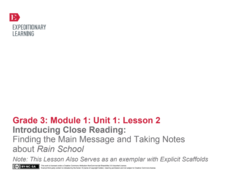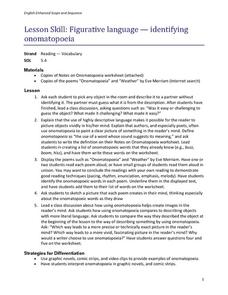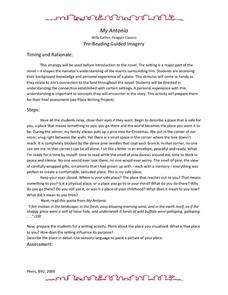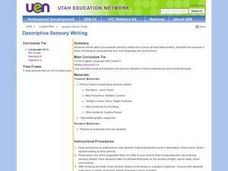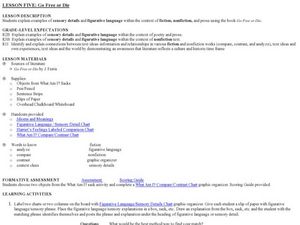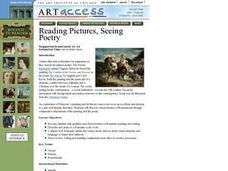EngageNY
Close Reading of Thank You, Mr. Falker: Identifying the Superpowers of Reading
Third graders read excepts from the story, Thank You, Mr. Falker in order to gain practice in understanding an unfamiliar story by focusing on the details. They use a worksheet, embedded in the plan, which directs them to certain...
EngageNY
Close Reading of That Book Woman: How Did People Access Books in Rural Areas of the United States?
For this ninth lesson plan in a larger beginning-of-the-year unit, close reading skills are used independently to find the gist of the story That Book Woman. Rereading for important details is the targeted skill to unlock a deeper...
EngageNY
Introducing Close Reading: Finding the Main Message and Taking Notes About Rain School
This second lesson in a larger unit is perfect for the beginning of the year because it explicitly teaches 3rd graders how to use close reading skills by identifying unfamiliar words, figuring out the gist, and defining important...
Curated OER
Creative Writing Workshop (Middle, Reading/Writing)
Bring this lesson into your unit about creative writing and precise language. First, middle schoolers create a piece of writing with the help of their classmates. In the second part of this workshop, they edit their own piece of writing....
Curated OER
Figurative Language- Identifying Onomatopoeia
A study of onomatopoeia for 5th graders is here for you. Pupils discover that the use of highly descriptive language makes it possible for readers to picture objects in their minds. After engaging in a class discussion and listening to...
Curated OER
My Antonia: Prereading Guided Imagery
What makes a place safe? What makes a setting effective? Explore the safe spaces and descriptive language with a prereading activity for Willa Cather's My Antonia. The teacher describes his or her own safe space and then prompts pupils...
Curated OER
Reading Examples
Young writers read excerpts from Gary Paulsen's memoir to identify figurative and literal language that contain sensory details. They determine which selections are examples of sensory language and fi the language is used literally or...
Poetry4kids
Personification Poetry Lesson Plan
Scholars take part in two exercises to boost their knowledge of personification. After reading a detailed description and excerpts from famous poems, writers list action verbs and objects then combine words to create a humorous...
Roald Dahl
Charlie and the Chocolate Factory
You can't read Roald Dahl's Charlie and the Chocolate Factory without craving the rich treats described in Dahl's vivid prose. Young writers try their hands at sensory language with a lesson plan that prompts them to write about...
Forum
A Research Toolkit of 12 Reading Strategies for the Foreign Language Classroom
Learning to read is not a simple task, but there are methods for assisting pupils as they develop literacy skills. The first four pages of this resource include information about language development and reading development, as well as...
Curated OER
Descriptive Prompt: Precise Language
Incorporate sensory details into a piece of descriptive writing. First, elementary and middle schoolers improve a piece of writing by using precise, vivid language, as well as appropriate word choice. They then listen to a variety of...
National Park Service
The Poet's Toolbox
If you need a lesson for your poetry unit, use two poems by Henry Wadsworth Longfellow ("Rain in Summer" and "The Slave in the Dismal Swamp") and a resource on Elements of Poetry. The lesson plan guides you through activities...
Curated OER
"Snapshot" Exercises & Sensory Detail Word Bank
Read a sample of creative descriptive writing to your science class. Discuss how writing can be used to record and communicate observations that scientists make. Reading selections and thought-provoking questions are suggested. Also...
Curated OER
Go Free or Die: Figurative Language
Figures of speech, sensory details, and academic language are all targeted while reading Chapter Two of J. Ferris’ Go Free or Die. First, learners engage in an exercise to practice describing with detail. Then, partners use a...
Curated OER
Descriptions with The Very Hungry Caterpillar
Explore famous artists of the Spanish-speaking world to practice describing things. The kids will identify the color each picture uses, whether figures are large or small, what the people look like, etc. Then, read The Very Hungry...
Curated OER
Strong Descriptive Writing: James and the Giant Peach
Support your writers! Clear procedures and appropriate support make this a superb resource for elementary writing instruction. Ready your class to compose original descriptive paragraphs inspired by the episode in Roald Dahl's James and...
Curated OER
Descriptive Writing Using the Book Rumpelstiltskin
Use the fairy tale Rumpelstiltskin to teach your third grade class about descriptive writing. Following a teacher read-aloud of the story, the class brainstorms a list of adjectives describing the main character. Students use this list...
Student Achievement Partners
Eleven
Turning 11 comes with a range of emotions. Explore those emotions by reading the short story "Eleven" by Sandra Cisneros. Readers analyze the main character's reactions to the events of her day. Then, they write an essay describing what...
Teachers.net
Figurative Language
When is a staple remover a fanged monster? In your ELA classroom when you're teaching this fun figurative language lesson, of course! Get your young writers using figurative language by making a game of it. Give groups a paper bag full...
Curated OER
Reading Pictures, Seeing Poetry
Learners examine the painting, The Combat of the Giaour and Hassan based on a poem by Lord Byron. They compare how Romantic artists and writers made choices about visual elements and language to depict their subjects.
Curated OER
A Creative Presentation
Bring writing to life with this lesson in which elementary and middle schoolers create a display of the imagery they identify in a series of Gary Paulsen books. They read the suggested materials, identify imagery and descriptive...
Curated OER
The Sound of…Poetry!
Scritch, scratch, scritch. It's the sound of pupils writing poetry! Focus on sensory language and onomatopoeia with a writing lesson. After listening to some sounds, learners examine a couple of poems that include sound words and then...
ReadWriteThink
Literature Circles: Getting Started
Make reading more enjoyable and interactive with literature circles! Here you'll find detailed lessons to begin the literature circle process. Ten lessons introduce each role learners take on. Literature circle roles include...
Curated OER
Identifying Descriptive Language
Third graders analyze a text to find descriptive language. For this language arts lesson, 3rd graders read a text looking for descriptive words that describe the character.


